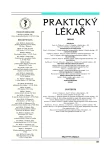Molecular methods in cytogenetic investigations in clinical oncology
Metody molekulárně cytogenetického vyšetření v klinické onkologii
Chromozomální aberace postihující nádorovou buňku jsou často specifické pro určitý typ nádoru. Jejich průkazu se využívá v klinické praxi k potvrzení diagnózy, při atypickém histologickém nálezu, neobvyklém klinickém průběhu nebo k odhadu prognózy. Detekují se vyšetřením karyotypu, fluorescenční in situ hybridizací (FISH) nebo některými jejími variantami – mnohobarevnou FISH (mFISH), spektrálním karyotypováním (SKY) nebo srovnávací genomovou hybridizací (CGH). V práci demonstrujeme verifikaci periferního primitivního neuroektodermálního nádoru ledviny průkazem pro nádor specifické translokace t(11;22) a upřesnění diagnózy germinálního nádoru mediastina s maligní transformací do rabdomyosarkomu průkazem zmnožení genetického materiálu 12p. Průkaz Philadelphského chromozomu – t(9;22) – je významný pro diagnostiku chronické myeloidní leukémie. Cytogenetické vyšetření je také nezbytné pro klasifikaci myelodysplastického syndromu (MDS), protože některé formy tohoto onemocnění jsou definovány právě na základě chromozomálních aberací. Prognóza některých nádorů je spojena s přítomností specifických chromozomálních aberací. Další významnou indikací je hledání znaku, který umožní průkaz minimální nádorové nemoci. Metody molekulární cytogenetiky představují zavedené diagnostické postupy se širokým spektrem využití v klinické onkologii. Tato vyšetření se stala součástí řady diagnosticko-léčebných protokolů a při vyšetřování pacienta s podezřením na zhoubný nádor je nutné na ně vždy myslet. V neposlední řadě se v současnosti zavádí do praxe cílená protinádorová terapie, zaměřená proti specifickým buněčným molekulám (prokázaným právě molekulárně cytogenetickým vyšetřením).
Klíčová slova:
zhoubné nádory – chromozomální aberace – karyotyp – flurescenční in situ hybridizace – srovnávací genomová hybridizace.
Authors:
A. Vícha; T. Eckschlager
Authors‘ workplace:
2. LF UK a FN Motol, Praha
přednosta prof. MUDr. J. Starý, DrSc.
; Klinika dětské hematologie a onkologie
Published in:
Prakt. Lék. 2005; 85(7): 387-390
Category:
Various Specialization
Overview
Chromosomal aberrations affecting the tumor cell are frequently specific for a certain type of tumor. The demonstration of them is applied in clinical practice to confirm the diagnosis, in an atypical histological finding, unusual clinical course, or for prognostic histological finding, unusual clinical course, or for prognostic estimates. They are detected by examining the caryotype, by fluorescence in situ hybridization (FISH) or by its variants – multicolor FISH (mFISH), spectral caryotyping (SKY), or comparative genomic hybridization (CGH). Examples are the verification of a peripheral primitive neuroectodermal kidney tumor by the demonstration of a translocation, t(11;22), specific for the tumor, and the specification of the diagnosis of a germinal tumor of the mediastinum with malignant transformation into a rhabdomyosarcoma by the demonstration of amplified 12p genetic material. Demonstration of the Philadelphia chromosome, t(9;22), is important in the diagnostics of chronic myeloid leucemia. Cytogenetic investigation is also essential in the classification of the myelodysplastic syndrome (MDS) in as certain forms of that disease are defined on the basis of chromosomal aberrations. Prognosis in certain tumors is connected with the presence of specific chromosomal aberrations. Another important indication is the search for signs that allow the demonstration of a minimal tumor disease. Molecular cytogenetics methods represent established diagnostic procedures having a wide spectrum of applications in clinical oncology. Such investigations have become a component of a number of diagnostic and therapeutic protocols, and that should be kept in mind in the examination of a patient suspect of a malignancy. Last but not least, at present there is being introduced into practice antitumor therapy focused against specific cellular molecules demonstrated namely by molecular cytogenetic investigation.
Key words:
malignant tumors – chromosomal aberrations – caryotype – fluorescence in situ hybridization – comparative genomic hybridization.
Labels
General practitioner for children and adolescents General practitioner for adultsArticle was published in
General Practitioner

2005 Issue 7
- Advances in the Treatment of Myasthenia Gravis on the Horizon
- Hope Awakens with Early Diagnosis of Parkinson's Disease Based on Skin Odor
- Memantine in Dementia Therapy – Current Findings and Possible Future Applications
- Memantine Eases Daily Life for Patients and Caregivers
- Possibilities of Using Metamizole in the Treatment of Acute Primary Headaches
-
All articles in this issue
- Q fever – clinical picture
- Q fever: properties of the agent
- Molecular methods in cytogenetic investigations in clinical oncology
- How willing are patients to comply with regimen measures?
- Delirium treated at a gerontopsychiatric ward for acute cases
- Horner’s syndrom: Topical diagnostics of the causative lesion (three case reports)
- Lemierr’s syndrome
- The general practitioner in the eyes of his patient: Interpretation of the results of an empirical survey
- Respecting previously expressed wishes of the patient
- Risks and expectations in health care
- General Practitioner
- Journal archive
- Current issue
- About the journal
Most read in this issue
- Lemierr’s syndrome
- Horner’s syndrom: Topical diagnostics of the causative lesion (three case reports)
- Q fever: properties of the agent
- Q fever – clinical picture
